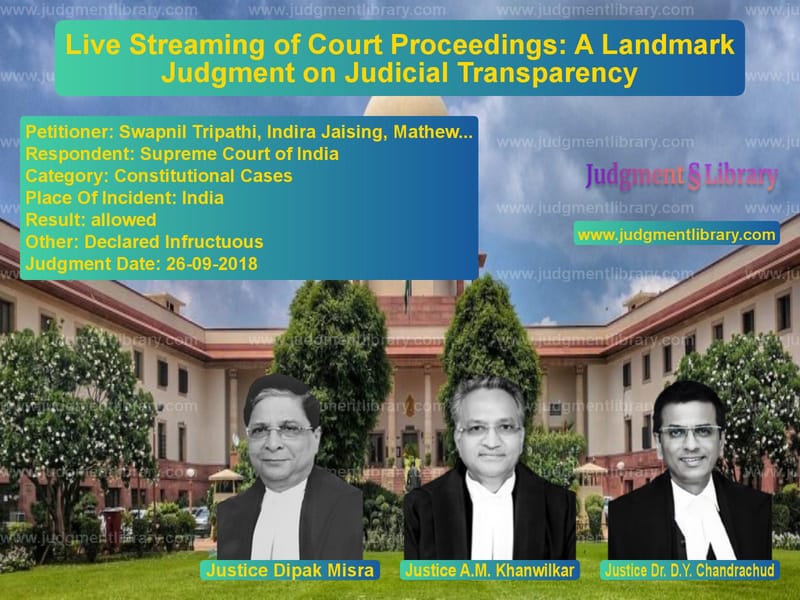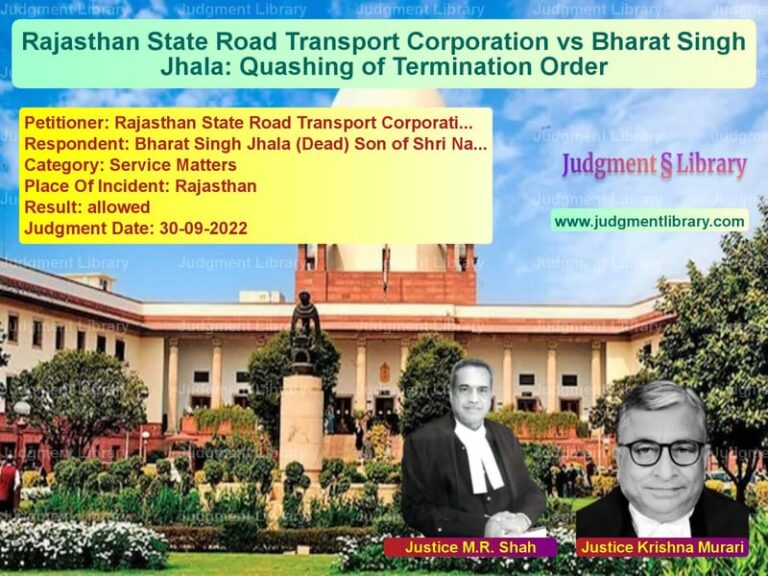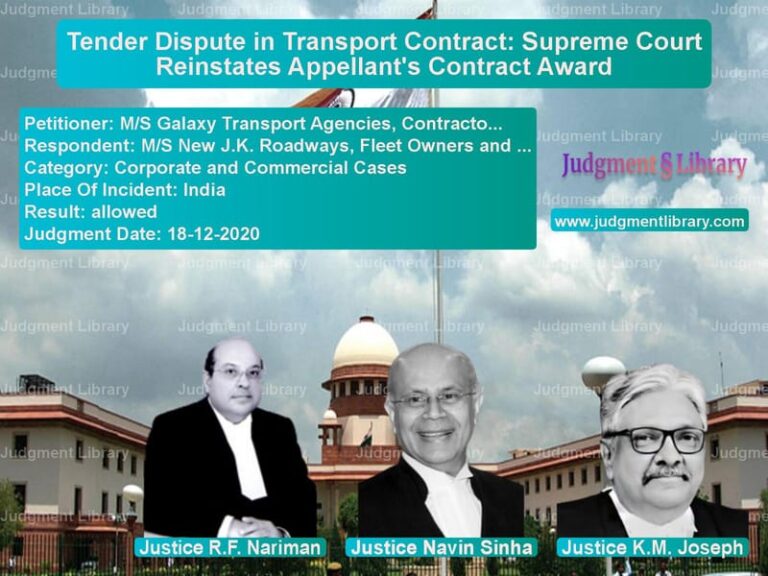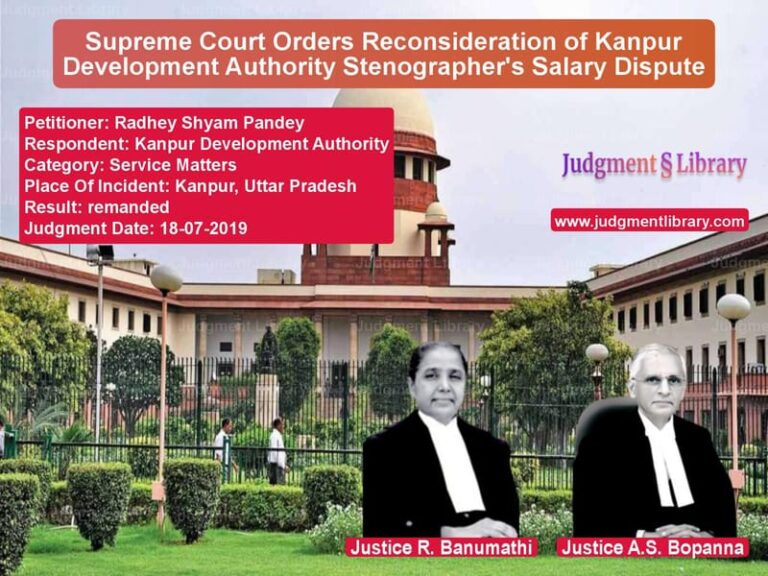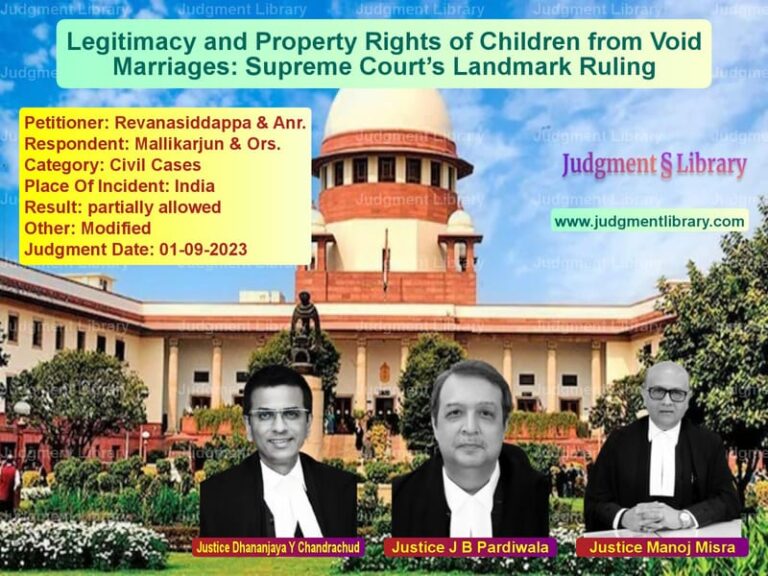Live Streaming of Court Proceedings: A Landmark Judgment on Judicial Transparency
The case of Swapnil Tripathi vs. Supreme Court of India is a landmark judgment that has paved the way for greater judicial transparency in India. The Supreme Court, in its decision on September 26, 2018, ruled in favor of live-streaming of proceedings for cases of constitutional and national importance. This ruling was a step toward ensuring that justice is not only done but also seen to be done, as it allows greater public access to court proceedings.
The judgment was delivered in response to multiple writ petitions filed by Swapnil Tripathi, Indira Jaising, Mathews J. Nedumpara, and the Centre for Accountability and Systemic Change. The petitioners sought a declaration that Supreme Court proceedings of constitutional significance should be live-streamed for public viewing. The Court analyzed the principles of open justice, judicial accountability, and technological advancements that make live-streaming feasible.
Background of the Case
The petitioners argued that live-streaming of Supreme Court proceedings would enhance transparency and improve public access to judicial proceedings. The Court deliberated on the need to balance the principles of open courts with concerns regarding privacy, security, and confidentiality in certain sensitive cases.
The key issues before the Court were:
- Whether live-streaming of judicial proceedings is a constitutional right under Article 21 and Article 19(1)(a) of the Indian Constitution.
- Whether live-streaming is an extension of the principle of open courts.
- Whether certain safeguards need to be in place to ensure fairness and integrity in live-streaming.
Arguments by the Petitioners
The petitioners contended that:
- The right to know and receive information is a fundamental right under Article 19(1)(a) of the Constitution.
- Live-streaming will improve accessibility for people who cannot physically attend court hearings, including law students, researchers, and the general public.
- Technological advancements make it feasible to implement live-streaming with minimal cost and effort.
- Several international jurisdictions, including the United Kingdom, Canada, Australia, and Brazil, have already adopted live-streaming of court proceedings.
Arguments by the Respondents
The Supreme Court of India, through its Secretary General, raised the following concerns:
- Live-streaming could compromise the privacy of litigants, particularly in sensitive matters such as matrimonial disputes and sexual assault cases.
- The presence of cameras could influence the behavior of lawyers and judges, potentially altering the natural course of proceedings.
- Ensuring the security and confidentiality of certain cases might become a challenge.
Supreme Court’s Analysis and Judgment
The Supreme Court analyzed the concept of open justice and its significance in a democratic society. The Court cited precedents such as Naresh Shridhar Mirajkar vs. State of Maharashtra (1966) to reaffirm that public trial in open court is essential for fairness, objectivity, and impartiality.
Key Observations of the Court
- Live-streaming of court proceedings is an extension of the open court principle.
- It promotes transparency, judicial accountability, and awareness about the legal system.
- It helps disseminate information about important constitutional matters, allowing citizens to stay informed.
- The judiciary must evolve with technology to ensure greater access to justice.
The Court held:
“Live-streaming of court proceedings is in the public interest. It is a significant instrument for establishing accountability and transparency in the judicial process. We direct that a framework be established for implementing live-streaming of cases of constitutional and national importance.”
Guidelines for Live-Streaming
The Supreme Court laid down specific guidelines for the live-streaming of court proceedings:
Types of Cases to be Live-Streamed
- Cases involving constitutional interpretation.
- Matters of national and public importance.
- Cases impacting the legal rights of a large section of society.
Exempted Cases
- Matrimonial disputes.
- Cases involving minors and juveniles.
- Matters of sexual assault and rape.
- National security cases.
Implementation and Regulation
- The Supreme Court will retain copyright over live-streamed content.
- Live-streaming will be conducted with a minimal delay to filter confidential information.
- Broadcast will be restricted to news and educational purposes, and not for commercial use.
- The Chief Justice of India will have the authority to regulate live-streaming.
Impact of the Judgment
The decision to allow live-streaming of Supreme Court proceedings marks a transformative step toward greater judicial transparency. It ensures that justice is accessible to all citizens, irrespective of their location. Legal education and public awareness will be significantly enhanced by allowing law students, researchers, and the general public to witness court proceedings firsthand.
By adopting this reform, the judiciary has embraced technology as a tool for advancing the principles of democracy and open justice.
Petitioner Name: Swapnil Tripathi, Indira Jaising, Mathews J. Nedumpara, Centre for Accountability and Systemic Change.Respondent Name: Supreme Court of India.Judgment By: Justice Dipak Misra, Justice A.M. Khanwilkar, Justice Dr. D.Y. Chandrachud.Place Of Incident: India.Judgment Date: 26-09-2018.
Don’t miss out on the full details! Download the complete judgment in PDF format below and gain valuable insights instantly!
Download Judgment: Swapnil Tripathi, In vs Supreme Court of Ind Supreme Court of India Judgment Dated 26-09-2018.pdf
Direct Downlaod Judgment: Direct downlaod this Judgment
See all petitions in Fundamental Rights
See all petitions in Constitution Interpretation
See all petitions in Public Interest Litigation
See all petitions in Judgment by Dipak Misra
See all petitions in Judgment by A M Khanwilkar
See all petitions in Judgment by Dhananjaya Y Chandrachud
See all petitions in allowed
See all petitions in Declared Infructuous
See all petitions in supreme court of India judgments September 2018
See all petitions in 2018 judgments
See all posts in Constitutional Cases Category
See all allowed petitions in Constitutional Cases Category
See all Dismissed petitions in Constitutional Cases Category
See all partially allowed petitions in Constitutional Cases Category

